Mugs and Memories
A weekly pub night keeps summer camp friends connected through the decades
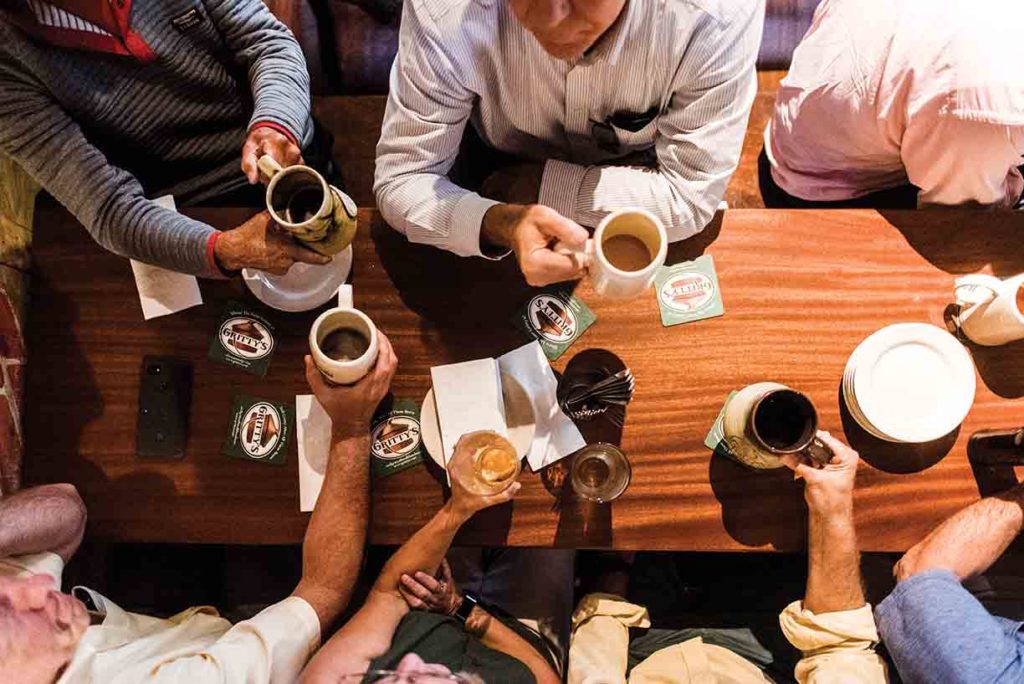
Many of the Timanous group members are also members of Gritty’s mug club.
A little after 5 p.m. on a Tuesday, Gritty’s brewpub in Portland is just beginning to gear up for the evening when Gorham Middle School math teacher David Chidsey drops off his friend, retired teacher and coach Jake Congleton. By the time Chidsey returns from parking his car to join him at a long table in the pub’s dining room, Congleton, 86, is seated against the fanciful mural of beer-making nude angels cavorting across the wall, positioned so he appears to be in a comely angel’s lap. More friends wander in, telling the server their mug numbers and taking their own usual places at the table. The size of the group waxes and wanes with the seasons, but the longtime friends have gathered here every Tuesday for more than three decades, bound by their common experiences at Camp Timanous, a boys camp on Panther Pond in Raymond.

Jack Leyden has been a counselor at Camp Timanous in Raymond for 36 seasons. In the summer of 1989, Leyden and his late friend, longtime camp program director Sandy Tattersall, visited Gritty’s brewpub in Portland on their day off; a group associated with the camp has met there every Tuesday evening ever since. 
Gritty’s was Maine’s first brewpub since Prohibition when it opened in December 1988. 
Gritty’s co-founder, Richard Pfeffer, at left, joins the group for a pint. Seated across from Pfeffer is David Suitor, who took over as camp director from his father and served as co-director with his wife, Linda, for 26 years.
The story of how the weekly tradition began goes something like this: In the summer of 1989, Camp Timanous head counselor Jack Leyden and his best friend, chief counselor and program director Sandy Tattersall, had Tuesdays off from their camp responsibilities. One Tuesday, they decided to check out the new brewpub that had opened the previous December in Portland. Founded by Ed Stebbins and Richard Pfeffer, Gritty’s was Maine’s first brewpub since Prohibition, and along with D.L. Geary Brewing, which opened in 1983, was a first mover in the craft brewing revolution in Maine.
On subsequent Tuesdays, Leyden and Tattersall were joined at “their” Gritty’s table by fellow Timanous counselors, who became some of the brewpub’s first mug club members. The group included David Suitor, a teacher at St. Mark’s School in Massachusetts who had taken over as camp director from his father, Johnny Suitor, in the early 1980s. By that time, Congleton had retired from Timanous after a 36-year association that began when he was an eight-year-old camper. While he was later recruited to start a coed camp, Kingsley Pines, right next door to Timanous, he is an anchor member of the Gritty’s group.
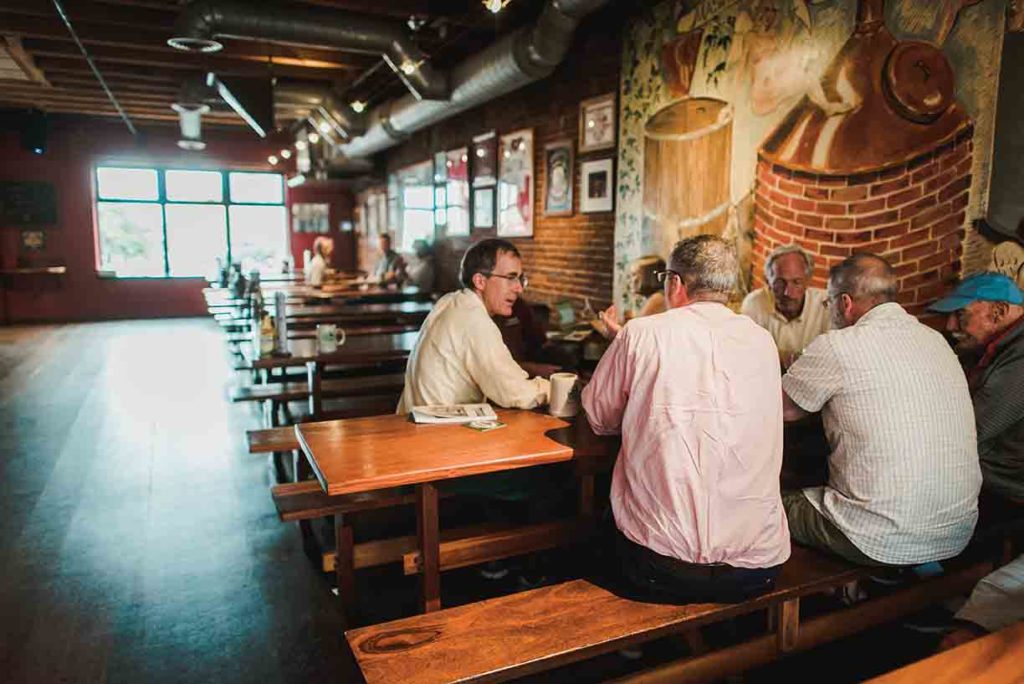
Working in schools left these counselors and directors free in the summer for their beloved Camp Timanous. “To be quite honest, I graduated from Harvard Business School but became a schoolteacher so I could go back to camp,” says Congleton, who was dean of students, a history teacher, and head football and basketball coach at Groton School from 1957 to 1995. “Our close friends would say, ‘When are you going to grow up?’” says Leyden, who was not a Timanous camper himself but became a counselor in 1984. While he now lives in Florida in the winter, Leyden was dean of students at Hebron Academy when he started spending his adult summers at Timanous. Before Tattersall died in 2017 at age 64, Congleton’s coveted seat next to the mural was his spot, with Leyden across the table—in the seat he still takes when he returns to Maine. “They’re just creatures of habit,” jokes Leyden’s younger brother, Jeff, who is a Gritty’s regular even though he had a short tenure at Timanous. “Do you know what Jack and Sandy did almost every Tuesday on the way back to camp? They stopped at Pat’s Pizza in Windham and Jack ordered a sweet sausage and cheese—every single time.”
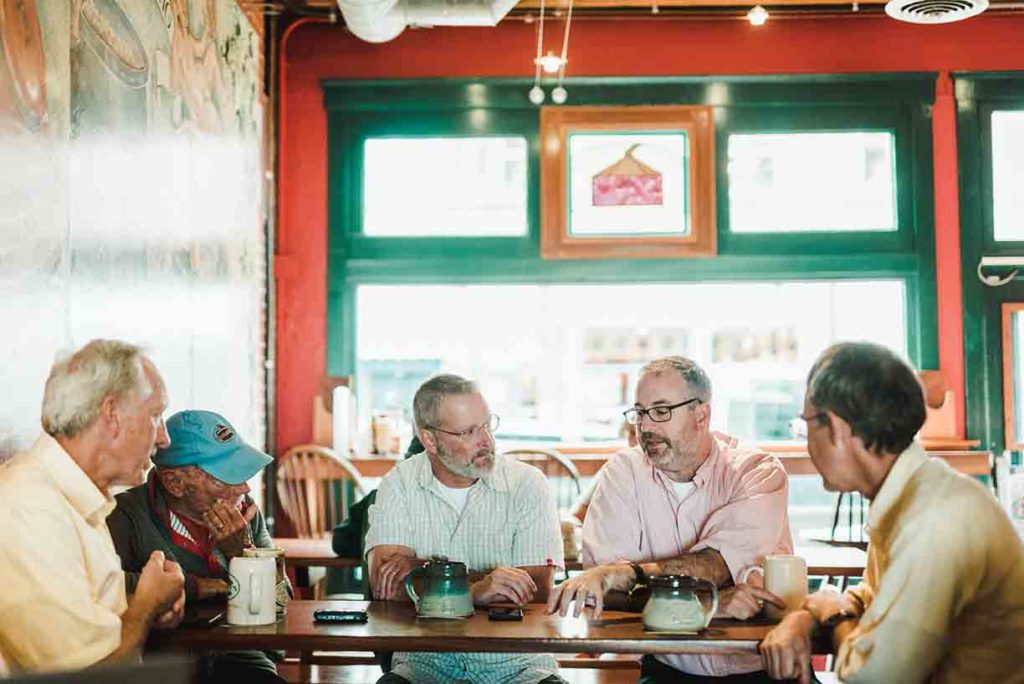
Chidsey calls from the other end of the table, “Pine, how about a beer?” Everyone seems to have a nickname from camp: since Jack Leyden was (and still is) “Pineman,” Jeff became “Spruce”; Suitor inherited “Suitcase” from his father, and Chidsey is “Chids.” Tattersall, a revered leader and friend to all, was “Duck,” and his passing hit the camp community hard. He is frequently remem-bered and honored with a toast “to Duck” when someone joins the table. The nickname tradition is a modern one, but camp-specific names started with Dr. Luther Halsey Gulick and his wife, Charlotte, who adopted the names of Timanous (“guiding spirit”) and Hiitini (“abundant life”) when they founded Camp Wohelo for girls on Sebago Lake in 1907. Each camper and counselor received a camp name, too. Ten years later, the Gulicks founded Timanous on a separate Sebago Lake site, moving it to its present location on Panther Pond in 1920. Just as at Wohelo, non-competitive activities and rituals inspired by Native American practices define life at the boys camp. Sunday night council fires are started with campers pulling on a rope wrapped around a thick wooden dowel. “It’s a contrast to the challenges boys have growing up; they’re learning archery, sailing, swimming, and how to coexist with people from around the world,” says Jack Leyden, whose two grown sons, Nick and Jake, were campers and also worked at camp. (Nick is one of three current Timanous counselors who works at Eaglebrook School in Massachusetts.) “In today’s world we don’t sit down at the dinner table. At camp you have seven kids and two counselors at the table, and nobody has an iPhone, nobody has anything in their ears,” says Congleton. Like many at the table, he sports at least one item of clothing with the Timanous logo, a triangle that stands for “mind, body, and spirit.” If the symbol looks familiar, it’s because camp founder Gulick also designed it for the YMCA.
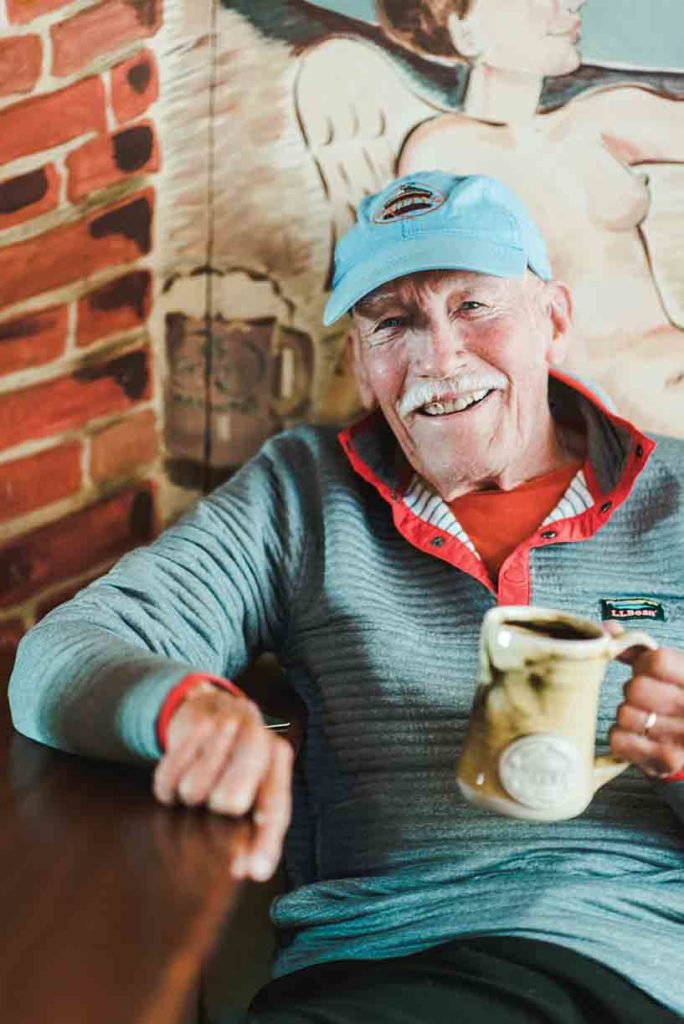
Jake Congleton spent 36 summers at Timanous. The rest of the year, he was dean of students, a history teacher, and head football and basketball coach at Groton School in Massachusetts. 
The Timanous Story, written by Congleton and Suitor, was published in 2010. 
Noonan (left), and Grant Pennoyer raise their mugs. When a toast is made it is often “to Duck,” which was Tattersall’s camp nickname.
Summer camp is well known for building strong friendships that can last lifetimes, especially when campers become counselors, as they often do at Timanous. One particular group of alumni have been friends since the 1960s and ’70s; they have a reunion at camp every Labor Day weekend, and from this group, there have been six weddings over the years on the Saturday after camp closed for the season, scheduled so that friends who were working at camp could attend. One of them was David and Linda Suitor’s, camp co-directors for 26 years, who are now Camp Timanous Foundation board members and advisors to current director Garth Altenburg. “The bond is that camp got us at a very impressionable age, and along with skills we developed camaraderie,” says David Suitor. “And we continue to build relationships and connection through our campers.”
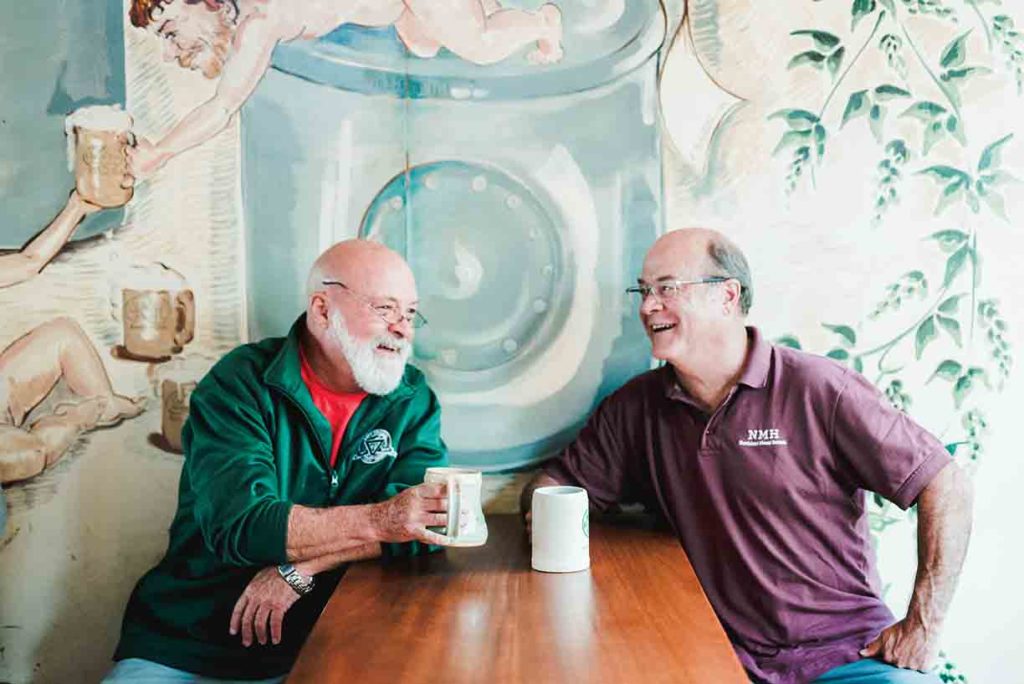
Beyond summertime reunions on Panther Pond, what is it that keeps this group coming back to a brewpub in Portland every Tuesday, all year? “It’s all about shared experiences; I’ll start talking about a camping trip, and I remember some of the same things about it that Frodo did,” Suitor continues, referring to board member Fred Hollister. Chidsey has a slightly different take. “People like familiarity and something they can count on,” he says. “It’s not email, it’s not Facebook, it’s not texting. You know someone will be here and be excited to see you.” Foundation board chair Craig MacDonnell calls Chidsey “the keeper of the flame,” in part for the 90 emails he sends out each week to camp contacts as far away as Europe. “I share news and count down the weeks until camp starts,” Chidsey says. “And I always write, ‘We’ll be at Gritty’s on Tuesday—come join us.’”

